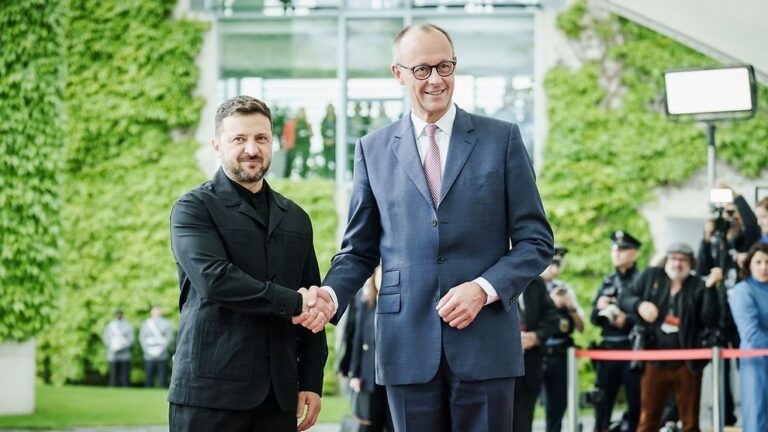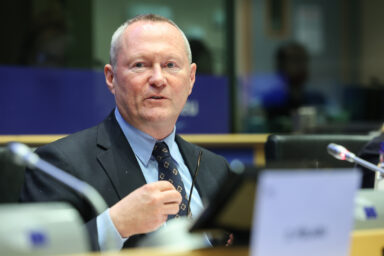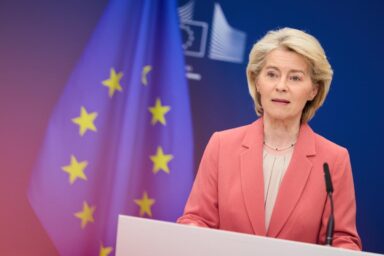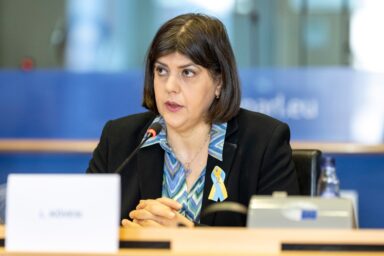Last week, the European Commission proposed a plan to unlock billions in support for Ukraine by leveraging frozen Russian assets. The scheme, which could generate as much as €140bn, is to function as a ‘reparations loan’. Ukraine would only repay it once Moscow has provided compensation for the destruction the invasion caused.
Commission President Ursula von der Leyen introduced the idea in her State of the Union speech earlier this month, arguing that European taxpayers cannot indefinitely shoulder the cost of Ukraine’s defense. “This is Russia’s war. And Russia must pay,” she said. This week, EU leaders are likely to discuss the plan in greater depth.
A complex mechanism
At the center of the proposal is Euroclear, the Belgium-based central securities depository that holds the bulk of Russian central bank assets immobilized under sanctions. The reserve is now worth about €176bn, with additional inflows likely in the coming years as maturing securities automatically convert into frozen cash.
According to a Commission document circulating among EU ambassadors, Euroclear would transfer this cash to the Commission. The Commission would then issue a zero-interest loan to Ukraine, while signing a special debt contract requiring Euroclear to reinvest in order to regain the transferred funds.
The total operation would mobilize about €185bn, with €45bn used to back an existing G7 credit scheme. Around €140bn would thus be available for Ukraine. Disbursements would come in stages and could apply to government operations, emergency relief, and military needs.
You might be interested
Repayment of the funds to Moscow would only happen if Russia meets two conditions: ending its aggression and compensating Ukraine for the damages. Once reparations reach their destination, Ukraine would repay the Commission, which would in turn settle with Euroclear before the funds finally return to Russia.
On paper, the assets thus remain Russian property. In practice, given the unlikelihood of Moscow ever agreeing to pay reparations, Russia will lose the funds.
Legal and political challenges ahead
The Commission presents the scheme as temporary, distinct from confiscation of assets, illegal under international law. Still, the approach stretches legal interpretation. “Critically, this whole operation would not touch the sovereign assets of Russia (…) and it would be temporary,” the Commission insists.
German Chancellor Friedrich Merz is a strong proponent of the move. In an opinion piece in the Financial Times last week, he urged other leaders to move forward with the plan. “We need a new impetus to change Russia’s calculations,” Mr Merz wrote. “Now is the moment to apply an effective lever that will disrupt the Russian president’s cynical game of buying time and bring him to the negotiating table.”
Belgium has been skeptical. The government has warned that moving frozen Russian assets, most of which are sitting in Belgian banks, risks damaging both the immediate and long-term credibility of Belgium as a hub for financial services. “Taking Putin’s money and leaving the risks with us. That’s not going to happen, let me be very clear about that,” Belgian Prime Minister Bart De Wever said last Friday.
In total, Belgium has immobilized €258bn in Russian-linked assets, more than any other EU country. Of this, €65bn consists of assets tied to sanctioned individuals and companies, while €193bn relates to Russian central bank reserves.
The Hungary problem
The Belgian Treasury, responsible for supervising sanctions, has in the past already faced a multitude of legal claims from banks, investors, and individuals seeking to release funds. More than 800 requests for unfreezing are pending, and the Council of State has already registered about 200 legal proceedings. Many blocked accounts in fact belong to individuals that are not directly under sanctions, officials have acknowledged. As much as 80 percent of the frozen funds may legally belong to people with no link to the war, raising the risk of compensation claims against the state.
We need a new impetus to change Russia’s calculations. — Friedrich Merz, Germany’s Bundeskanzler
Even if Belgium can be convinced, Hungary may still present an obstacle. Sanctions regimes face a fresh renewal every six months and require unanimity, giving any single member state the ability to block the arrangement.
The Commission has suggested invoking the “parallel clause,” which would allow decisions by qualified majority. Legal experts are now exploring whether the decision on the so-called reparations loan could indeed be a matter for qualified majority instead.
Moscow’s warnings
Russia has denounced the discussions as theft. Former president Dmitry Medvedev, now deputy chair of the Security Council, threatened that Moscow would take more Ukrainian territory and pursue any European state attempting to use its reserves “until the end of the century,” both in courts and by other means if Europe goes ahead with the plan.
Nonetheless, President Vladimir Putin has previously suggested to have already accepted this loss as a necessary sacrifice to reduce Russia’s reliance on European payment systems. Putin has argued that such measures would trigger an “irreversible trend toward regionalization of the financial system,” which he presents as a positive development for the global economy. He has also suggested that Russia would instead build its own payment systems for use among allied states.
Taking Putin’s money and leaving the risks with us. That’s not going to happen, let me be very clear about that. — Bart De Wever, Prime Minister of Belgium
Bankers and legal experts in Europe are indeed wary of the precedent, fearing it could damage the long-term reputation of European markets.
What’s next?
EU leaders are meeting in Copenhagen today for an informal gathering where discussions around the loan are on the agenda. No formal decisions will be made. Those are expected at the summit at the end of October, after finance ministers meet in Luxembourg on October 10 to examine the proposal in detail.











